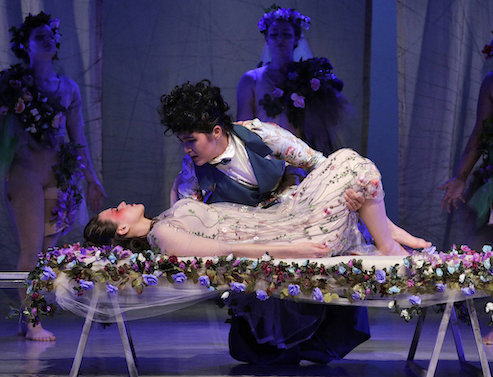For some years now West Edge Opera has presented three operas at their summer festival. One of these has been an opera from the baroque or classical periods, which has led to some wonderful musical and theatrical performances, based on wilder contemporary imaginings and re-staging of opera from a very different time and mindset.
This year the company’s opera was Gluck’s 1762 Orfeo ed Euridice, updated politically to encompass the vision of director and choreographer KJ Dahlaw. In the program Dahlaw identifies as “a queer, non-binary dance artist” and states that the production is a “reframing of the Orfeo myth through a queer lens.”

It’s easy to imagine such an interpretation. Baroque opera flourished in an atmosphere of gender fluidity. The castrati who were wildly popular at the time were vocally, and even physically, what we might now call non-binary. Born male but by choice, whether taken freely or forced, they changed their bodies sexually in order to alter their vocal register to the soprano and alto range; they existed in a physical state that was neither completely male or female, and with a vocalism that combined the two.
And though Gluck strove to reform early opera, many of the conventions of baroque opera remain in Orfeo ed Euridice. In Gluck’s several versions of the breakthrough opera – its various permutations written to suit the audiences for whom it was presented – Orfeo was sung by alto castrato, soprano castrato and haute tenor. In 1859 Berlioz would prepare a version for contralto. The opera’s role of Orfeo always encompassed the possibility of non-binary sexuality. That conception also existed in mythology, in portrayals of the singer Orpheus and his maenad followers and the Greek god Dionysus, who bears remarkable similarities to Orpheus.
The opera has only three soloist singers – Orfeo, Euridice and Amore – and a chorus. The musical setting, radical for the time, dispenses with many of the conventions of baroque opera, including (thankfully for some) the da capo aria, with its multiple repetitions allowing singers ample opportunity to display their vocal chops in impressive ornamentation.
The opera’s plot is rendered down to the most basic. Euridice dies and Orfeo mourns her. Amore appears to tell Orfeo that Euridice can return to the living, but in order to do that Orfeo must go to the underworld to retrieve her, and while bringing her back not look at her. He fails and Euridice dies again, the lovers separated again by death.
In the West Edge Opera version of Gluck’s opera Nikola Prinz sang Orfeo, Prinz’s mezzo taking on a heavier contralto quality in the role. Prinz was laudable in the gravity the singer imparted to the role vocally and theatrically. Maria Valdes was gorgeous as Euridice, her pure lyric tone making me wish she had been given a more substantial role than the opera allowed. Shawnette Sulker was a charming and seductive Amore, and as always a steady delight on stage.
What I find conceptually intriguing about the opera is its use of chorus as a compelling commentator and the many ballets that go along with the singing, creating an abstract reenactment of situation. The dancers are mourners, furies and the spirits of Blessed in Elysium. This separation of chorus and dancers, each functioning as a group and therefore elemental force, creates a complexity that enhances mythic qualities of the moment.
And it is here that I wish Dahlaw had developed a more compelling and innovative choreography, one with a clearer connection to the emotional panorama of the music. Neither the choreography nor the dancers were up to the level of the music or the instrumentalists.
Christine Brandes conducted. Admired for her singing, the accomplished soprano is now moving into conducting, and her presentation of the music was considered, evoking a quiet formal tone, even in the more hectic parts of the music, that was poignant and somehow tender. The chorus was placed offstage with the orchestra, which seemed like a missed opportunity for theatrical impact. Disembodied voices were perhaps more credible for the political ambitions of the production.
– Jaime Robles
West Edge Opera’s production of Orfe & Euridicecontinues through August 17. For information and tickets, visit westedgeopera.org.
